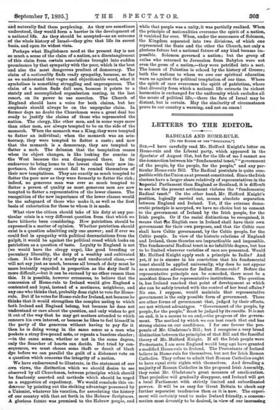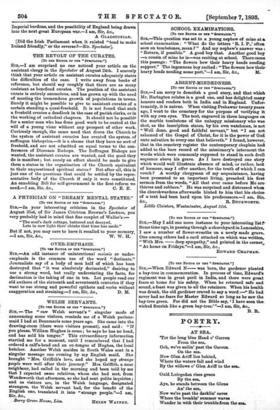LETTERS TO THE EDITOR.
RADICALS AND HOME-RULE.
[To THE EDITOR OP THE " SPECTATOR."' SIE,-I have carefully read Mr. Holford Knight's letter on Home-role and the Liberal party, which appeared in the Spectator of August 31st, but for the life of me I cannot see the connection between his "fundamental tenet," "government of the people, by the people, for the people," and any par- ticular Home-rule Bill. The Radical postulate is quite com- patible with the Union as at present constituted. Since theIrish electors have a larger share relatively of representatives in the imperial Parliament than England or Scotland, it is difficult bo see how the present settlement violates the "fundamental Radical tenet." On the other hand, Mr. Holford Knight's position, logically carried out, means absolute separation between England and Ireland. Yet, if the extreme demo- cratic principle is accepted, we have no choice but to consent to the government of Ireland by the Irish people, for the Irish people. Or if the racial distinctions be recognised, it means that tulle English race in Ireland shall have their own government for their own purposes, and that the Celtic race shall have Celtic government, by the Celtic people, for the Celtic people. In view of the historic relations of England and Ireland, these theories are impracticable and impossible. The fundamental Radical tenet is no infallible dogma, but has to be limited -wherever varieties of race are presented. Would Mr. Holford Knight apply such a principle to India P And yet, if he is sincere in his conviction that his fundamental tenet should be applied universally, why does he not appear as a strenuous advocate for Indian Home-rale ? Before the representative principle can be conceded, there must be a manifest fitness for representative institutions. The question is, has Ireland reached that point of development at which she can be safely trusted with the control of her local affairs P No one, I suppose, would maintain that representative government is the only possible form of government. There are other forms of government that, judged by their effects, are not without advantages. " Government of the people, by people, for the people," last be judged by its results. It is not an end, it is a means to an end,—the progress of the govern- ment. The method by which we can best reach that end has strong claims on our confidence. I for one favour the pro- posals of Mr. Gladstone's Bill ; but I recognise a very broad distinction between the principles of that Bill and the fanciful theory of Mr. Holford Knight. If all the Irish people were Protestants, I am sure England would long ago have granted a modified Home-rule to Ireland. The Protestants of Ireland believe in Home-rule for themselves, but not for Irish Roman Catholics. They refuse to admit that Roman Catholics ought to have equal civic rights with themselves. And dreading a majority of Roman Catholics in the proposed Irish Assembly, they resist Mr. Gladstone's great measure of amelioration. That prejudice will gradually disappear, and Ireland will get a local Parliament with strictly limited and subordinated powers. It will be as easy for Great Britain to cheek any further separatist tendencies then as it is now. The experi- ment will certainly tend to make Ireland friendly, a consum- mation most devoutly to be desired, in view of our increasing
Imperial burdens, and the possibility of England being drawn into the next great European war.—I am, Sir, &c.,
A GLADSTONIAN.
[Did the Irish Parliament when it existed "tend to make Ireland friendly," or the reverse P—En. Spectator].



































 Previous page
Previous page